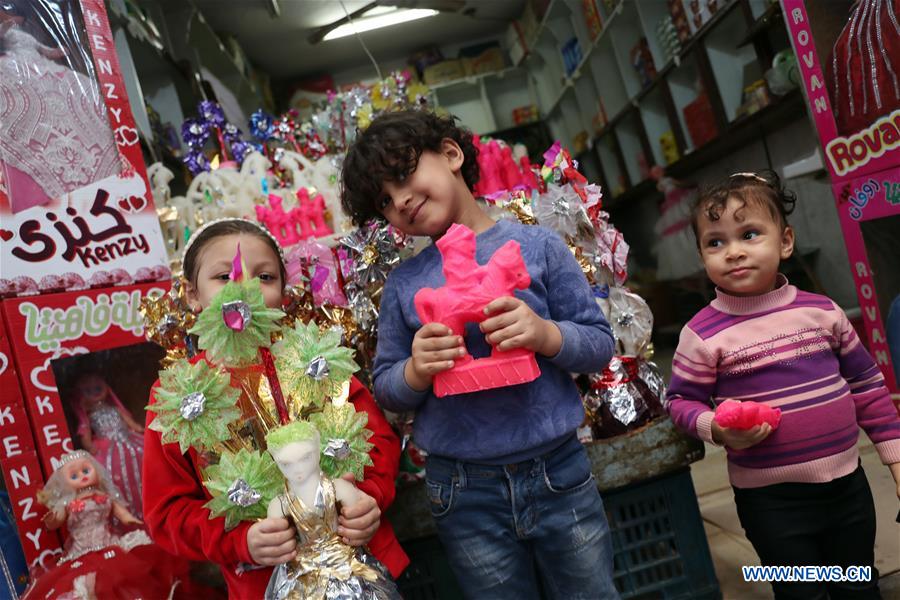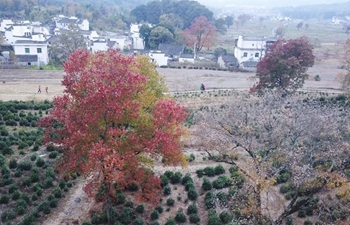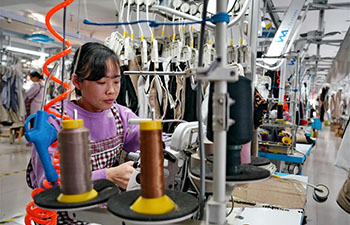
Children hold traditional candies in a market in Tanta, Egypt, Nov. 3, 2019. Shops and stalls of traditional sugar candies with various shapes and colorful covers flourish in Egypt ahead of the Islamic celebration of Prophet Muhammad's birthday, known as al-Mawlid al-Nabawi or al-Mawlid, particularly in Tanta city of Gharbiya province north of the capital Cairo. (Xinhua/Ahmed Gomaa)
by Mahmoud Fouly
TANTA, Egypt, Nov. 7 (Xinhua) -- Shops and stalls of traditional sugar candies with various shapes and colorful covers flourish in Egypt ahead of the Islamic celebration of Prophet Muhammad's birthday, known as al-Mawlid al-Nabawi or al-Mawlid, particularly in Tanta city of Gharbiya province north of the capital Cairo.
In the heart of Tanta, the most famous Egyptian city for making and trading al-Mawlid traditional sugar candies, crowds of customers thronged to sweet candy marketplaces with dozens of shops and stalls to buy boxes of candies or decorated sugar dolls or sugar horseman-shaped statuettes for their loved ones.
Manal Ahmed, a married employee in her 30s, was outside a shop at a marketplace in Tanta's well-known al-Athariya Street, picking bars of sugar and honey coated sesame, nuts and chickpeas and putting them in a box to buy.
"It's a joyful occasion that we wait for every year. I am here to buy several boxes of treats to give some to my children and gift others to my relatives and friends," the lady told Xinhua outside the shop.
Prophet Muhammad's birthday is celebrated on the 12th of the month of Rabi' al-Awwal of the Islamic calendar, which falls on Nov. 9 this year. The Prophet of Islam was born in Saudi Arabia's holy city of Mecca about 1,500 years ago.
The celebration of his birthday in Egypt has been associated with buying and gifting sugar candy boxes and sugar dolls and horsemen since the Fatimid dynasty that ruled Egypt for more than two centuries about 1,000 years ago.
"Tanta is famous for making and selling the various types of al-Mawlid sweet candies, sugar dolls and sugar man-on-horse statuettes. Many customers come here from nearby provinces to buy al-Mawlid candies," said Hosny Ayyad, a partner in a candy store in Tanta.
He explained that in contrast to the general price hikes in Egypt, the prices of the local ingredients of his products are lower than those of last year, noting that only the prices of some imported ingredients like coconuts and margarine are higher.
"So, our prices are generally the same as those of last year, and our sales are very good this year," Ayyad, whose shop was crowded with customers, told Xinhua.
In a nearby small factory for making al-Mawlid sugary sweets in Tanta, a dozen of workers were using different large bowls and machines to heat, stir, mix and squeeze ingredients of candies before they go through other machines to cut them into bars or discs.
"We have been making al-Mawlid candies for more than 40 years now. We prepare for this season four months earlier and we hire more workers to increase production capacity," Mohamed Osama, manager of the factory and son of its owner, said while monitoring a candy cutting machine.
Osama explained that their products used to be completely handmade before machines were introduced about 20 years ago, which increased production and saved a lot of time and effort.
On the other side of a disc candy cutting machine, a couple of workers received the products on wooden trays to be moved later to metal trays and taken to a packing machine.
"We line them on these wooden trays until they are dry enough for packing. We really work hard ahead of al-Mawlid al-Nabawi," said Umm Mahmoud, an old woman who has been working for the factory for about 18 years.
In the same neighborhood at the ground floor of a five-story building, Rabie Abd-Rabbu, a man who looked in his late 60s, was surrounded by wooden templates while he instructed the workers during their making of al-Mawlid sugar dolls and horsemen.
"The sales of al-Mawlid traditional sugar dolls and horsemen are not as high as in the past, but they still have their own customers. This business may decline, but it will never die out," the veteran al-Mawlid candy maker told Xinhua.











